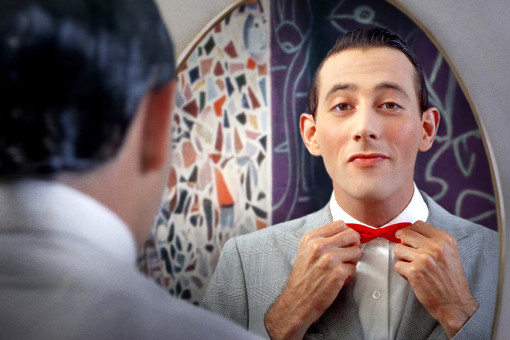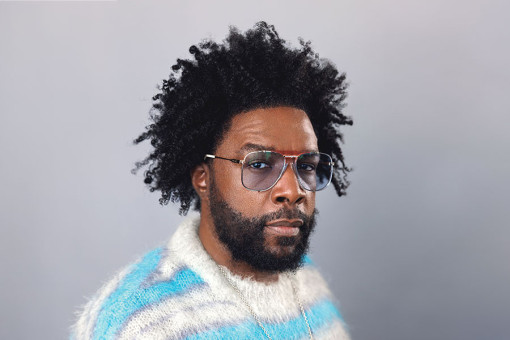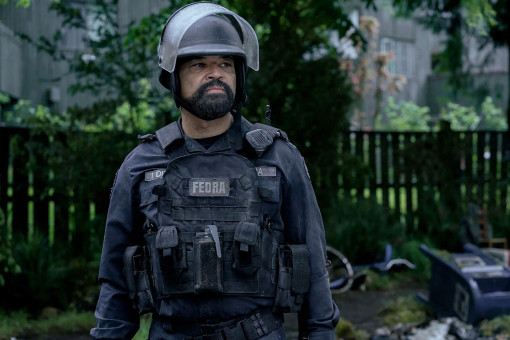One of the last places anyone would think to look for comedic material is at the bottom of the Atlantic where the Titanic sank in 1912, killing more than 1,500 people.
But there was Bowen Yang on SNL's "Weekend Update" with Colin Jost, playing the iceberg responsible for one of the most notorious disasters in world history. Only the iceberg was not concerned with the death and destruction he caused but rather with how he's been treated by the media.
Yang's portrayal of The Iceberg nearly melted social media — with praise, and more laughter.
Just a few weeks earlier, also on "Weekend Update," Yang used humor as a lens through which to view a tragic situation, the violent rise of anti-Asian hate crimes in this country.
It was something perhaps only he as the sole Chinese American cast member — the first Asian American ever to achieve that status in the late-night ensemble — could communicate most effectively to the audience.
Yang concluded the segment with an admonition to "fuel up" and do more to stop the hatred.
It was a powerful message from a comedian who admitted he did not have all the answers.
What Yang does have is a burgeoning portfolio of characters on SNL as well as outside projects including podcasts (Las Culturistas, Hot White Heist), acting roles on TV (Girls5eva, Awkwafina Is Nora from Queens) and voice acting gigs in several upcoming films.
Yang is also one of only about six openly gay cast members in the 46-year history of Saturday Night Live.
For Pride Month 2021, dressed in a cerulean blue suit and sparkly top, he graces one of four rotating covers of Entertainment Weekly marking the occasion. (The others are Lena Waithe, Mj Rodriguez and Lil Nas X, who recently performed on SNL.)
In 2018, Yang began his career on NBC's storied late night franchise as a writer after he had drawn attention on Twitter doing lip syncs of characters in famous scenes from movies and TV shows. Among them, Meryl Streep as Miranda Priestly in The Devil Wears Prada, Tyra Banks on America's Next Top Model and Julia Roberts in Erin Brockovich.
During his first-year stint on the SNL writing staff, Yang made his on-camera debut in March 2019, portraying North Korea's dictator Kim Jong-Un questioning Vladimir Putin about his ties to Donald Trump, with host Sandra Oh playing Kim's translator.
He was elevated to SNL cast member in September of 2019, a historic promotion that was overshadowed by a scandal involving another person named to the cast, Shane Gillis. Gillis was fired before he even started for making racist and homophobic slurs on his podcast.
Meanwhile, the fortunes of Yang and the other new hire at the time, Chloe Fineman, have continued to rise.
Yang's newfound prominence was also on display when he was asked to interview Jean Smart for Variety Studio: Actors on Actors season 14, which runs nationwide on PBS stations beginning this month.
Yang was looking for a physical copy of his newly-released EW cover issue when he spoke to emmys.com contributor Hillary Atkin over the phone from his Brooklyn home last week on a day that he termed sunny, humid and "gelatinous."
The conversation touched on topics like the quality of baked goods from Sara Lee, his self-proclaimed lowbrow podcast, using a movie star's name as his Instagram handle, words of wisdom from Lorne Michaels and life lessons from Kristen Wiig.
Let's rewind to the beginning of your SNL career. How did you get on staff as a writer and then how did you transition to becoming a cast member in 2019 for season 45?
I'd submitted a tape with no expectations that it would go anywhere. Somehow, this tape I'd thrown together cleared every gate. It came as a surprise to myself and I thought it was a fluke, but it kept escalating and went to the screen test stage. I met with Lorne a couple of times, and after the fourth audition he said to me, "You've gotten better every time."
I could hang my hat on that, realizing there needed to be some improvement.
But then I got the offer to write and I said yes. I revered the show for so long, and worked the standardly harrowing first season. It was the overwhelming trial by fire that everyone experiences. The speed at which things are done is an adjustment for anyone stepping into that environment.
Lorne called at the end of the summer after the first season to move me to the cast. He said the plan was to give me that first season to get my bearings so I knew how things worked operationally. He knew I would be scrutinized in a certain way by the audience. The biggest disservice would be to throw me in without a paddle, so it was very valuable.
What are some of your favorite characters you've played and why?
I really like Fran Lebowitz, especially because she said she did not like how I played her. I liked doing the French-Canadian news show and playing with the accent, which was fun after growing up in Montréal. And the delightful surprise of the character of The Iceberg. It was a fun place to live in for 3-4 minutes playing someone indignant with his media treatment.
Did you expect your character as The Iceberg to elicit the response that it did?
I didn't expect the responses, which are still delighting and surprising me. The kinds of people who've responded are bewildering to me. I have multiple friends in law school who've said different law professors have brought it up. I don't know the context, but the fact that legal minds have responded — that's a market I never thought I would live in.
Another big sketch of yours was the one in which Harry Styles plays the Instagram manager for Sara Lee bread, mistakenly using the brand's account instead of his own to write sexually graphic comments.
There are things I'm excited to do that I never expect to make it onto the show. That's one of them. It speaks to the way SNL gives creative control. Julio Torres wrote it with me. I didn't realize something like that could make it on TV. It's a container for different tones and sensibilities and subject matters. That's why the show has maintained some sort of appeal.
There's room for everything, a grab-bag, and hopefully, ideally, something for everyone.
The skit is very queer, raunchy, silly and remarks on the contemporary phenomenon of corporate social media accounts that have too human of a voice. It was fun to write a specific thing in that world. The company ended up sending us a gift basket with some of their products, including Artesano bread. Not artisanal, Artesano. It was really good.
Talk about your "Weekend Update" segment on anti-Asian hate in the wake of the Atlanta-area shootings and the horrible story of a grandmother in San Francisco being attacked, and the response you got.
It was very raw place to be, especially being one of two Asian people writing. It was kind of a triangulation of figuring out how to approach it. Celeste Yim was the writer. I said I was not sure if we should do it and wrestled with a way to make light of it. The priority was to be funny but acknowledge the sadness of the situation.
The show has a tradition of directing tragic events through some humorous context. We wanted it to have a funny rallying cry at the end. ["We ride at dawn, grandma."] It was very draining, and the response was really nice. It's hard to be precious when it was born of something so tragic.
I had a vulnerability hangover, and was very grateful to SNL for giving the platform. It had to be addressed in some way. I'm sure I'll look back and have a new perspective. It's a very raw thing in the moment.
Looking back over this last pandemic year for season 46, what was the experience like and what were the biggest challenges for you?
It was stamina. We had done six in a row with the election and were trying to figure out a way to make it safe, and stick around, as necessary. I'm still in awe of the way the show did that, prioritizing safety but duty-bound in the sense of providing some reprieve for the audience with every week's topics interpreted in some manner.
The challenge was keeping the ball in the air. At the end, it was a very emotional unclenching of the state we'd been in, keeping mental fortitude around meeting the occasion. That was the hardest thing, to rise to that expectation.
How did the pandemic affect working relationships with the writers and the cast and with Lorne? I'm sure you hope things will soon go "back to normal."
Part of the challenge this season is everyone had been so siloed, spatially taken away from each other, when you're used to the sense of proximity of being in the same room riffing.
Lorne understood that challenge and worked to make things safe when we had to convene. It makes you more reflective over the year and realize, "Wow, we were able to accomplish things that were so difficult." It forges new bonds with the cast and writers and Lorne appreciates that and what we were able to do. Everyone was moved by that.
We were so cautious, but now that circumstances are getting better, hopefully we will be able to write in the same room and be in the same room for the read-through. That's how you know what's funny enough to make it on the show. For my own part, I'm ready to return to some more organic process instead of the disjointed one we had.
For the Mother's Day episode, how was it to have many cast member's moms there on stage - and yours?
There was obviously a level of stress having parents in the workplace as it's usually the other way around. And there were some dads. I remember going into it, I was very stressed, on top of the usual lead-up, to make sure my mom had her bearings and wasn't overwhelmed. In the end, it was very comforting.
The next day was a rainy day, and I was reflecting how hard-won it was that we were all in the same place to share time together after all that had happened. I was thankful for the show to provide that and put it on display for people. I was lucky enough to go back to see my parents in Denver over the holidays, but it felt like a million years had passed because time had become so dilated. It was very emotional.
For a number of years now you have used the Instagram handle @fayedunaway. Has she or any of her reps contacted you about this?
No, they haven't. I would love to be sent a cease and desist and tell my children I was in a contentious situation with Oscar-winning actress Faye Dunaway.
Let's hear more about some of the topics you delve into on your podcast, Las Culturistas with Matt Rogers, whom you met when you were students at NYU.
The podcast is very loose and unstructured. We try to do nuanced conversations on everything from Mare of Easttown to Taylor Swift. It's pretty lowbrow. We try to bring lightness to whatever we talk about. There's no homework to do. It's very turnkey — we just come in and talk. It's been a nice steady anchor since 2016.
Do you feel undue pressure to be a role model because of your ethnicity and sexual orientation?
I've done okay by not thinking about that too much. If I was too concerned about maintaining a respectability level of being a role model, I'd be too hard on myself.
So many SNL cast members have gone on to huge careers in showbiz. What do you envision for your own career?
Probably something pretty boilerplate. Working at SNL, you have to be in the moment. I can't project too far out and that's a good thing. As stressful and demanding of a job as this is, there is an understanding that there are fulfillments to be made while you're on the show, like focusing on making sure you have a good run. From there, I'll figure it out.
With Kristen Wiig, I was struck by the fact that as she went along, there was no grand plan. She was able to intuit what she would do next after being in the present and I found that very interesting. I hope it works in the same way for me.
Talking to Lorne after the season finale, we had a conversation about how he's run into people in the business here — and there's no need to feel like you're God's gift or exceptional. It's the people who think "I got lucky to be in this situation" who have the best heads on their shoulders.
More articles celebrating Pride Month.
More articles celebrating Asian American & Pacific Islander Heritage Month.






















